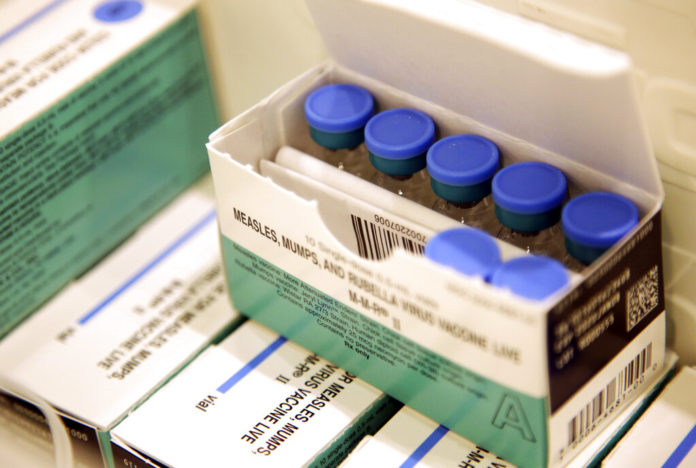
October 31, 2019 8:00 pm
WASHINGTON (AP) — Measles has a stealth side effect: New research shows it erases much of the immune system’s memory of how to fight other germs, so children recover only to be left more vulnerable to bugs like flu or strep.
Scientists dubbed the startling findings “immune amnesia.” The body can rebuild those defenses — but it could take years.
And with measles on the rise, “it should be a scary phenomenon,” said Dr. Michael Mina of Harvard’s school of public health, lead author of research published Thursday in the journal Science.
“This goes under the radar” because doctors wouldn’t necessarily connect a child’s pneumonia to measles they suffered a year earlier, Mina explained. “But would they have gotten it if they hadn’t gotten measles?”
The Harvard team analyzed blood samples taken from 77 children before and after a measles outbreak in an unvaccinated community in the Netherlands. They looked for antibodies, which remember viruses and bacteria they encounter to guard against a repeat infection. After recovering from measles, the youngsters were left with plenty of antibodies against that virus — but ones they’d previously harbored against other germs had plummeted.
In the most severe cases, “they’re just as vulnerable as if they were infants,” said study senior author Stephen Elledge, a Harvard geneticist. Elledge is paid by the Howard Hughes Medical Institute, which also supports AP’s Health & Science Department.
A separate study, published Thursday in Science Immunology, supported the findings. Researchers from Britain’s Wellcome Sanger Institute used the Dutch blood samples to genetically test antibody-producing cells, and concluded measles is eliminating enough to re-set the immune system to a baby-like state.
If protection against the misery — and sometimes life-threatening effects — of measles isn’t enough reason to vaccinate children, specialists said the two studies offer a powerful new rationale.
“There really are profound gaps and holes” in someone’s immunity after measles, said Dr. Anthony Fauci of the U.S. National Institutes of Health, which helped fund the Harvard work. “You ultimately recover but after a year or two or sometimes more.”
“It’s doubly important to vaccinate children,” agreed Dr. Mark Mulligan of NYU Langone Health, who wasn’t involved with the new research. “It’s a vaccine that protects against the specific target, measles virus, but also against immune suppression.”
Measles is one of the world’s most contagious viruses, able to spread through coughs and sneezes for four days before someone develops the characteristic rash. It sometimes leaves children with brain damage or hearing loss, and while deaths are rare in the U.S., measles killed 110,000 people globally in 2017.
The vaccine offers powerful protection but a lack of access means measles remains rampant in many lower-income countries. Even the U.S., where most children are immunized, has seen a resurgence fueled by outbreaks in unvaccinated communities that in turn threaten people too young or sick to be immunized. So far this year, the Centers for Disease Control and Prevention has counted more than 1,200 U.S. measles cases, the most since 1992.
Doctors have long known that people temporarily experience weakened immunity after measles. Using decades of health records, Mina previously reported that child deaths from other infections jumped after a measles outbreak, increases that lasted two or three years.
But no one knew why, until the new study.
The Dutch children started out pretty healthy: Technology developed in Elledge’s lab found antibodies in their blood against typical childhood germs. But two months after recovering from measles, the children had lost on average 20 percent of their usual antibody mix. Some lost up to 70 percent of protection against specific bugs, limiting their ability to respond if they encounter that germ again.
Importantly, researchers didn’t find loss of antibodies in “control” populations that didn’t get infected with measles — or in children after they received the measles vaccine.